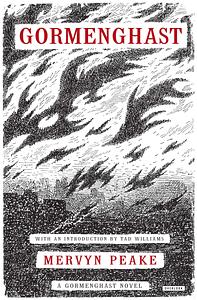Take a photo of a barcode or cover
http://nwhyte.livejournal.com/1627534.html
The second book of the famous trilogy, in which the evil Steerpike's plans to dominate Gormenghast Castle are resolved in vicious single combat with Titus Groan, the 77th earl. When I first read this, at least a quarter of a century ago, the two scenes that really stuck in mymind were the grotesque deaths of Deadyawn the headmaster, killed in a bizarre incident where his wheelchair intersects with a dealy schoolboy game, and of the twin aunts of Titus and Fuchsia, locked away by Steerpike to dies in isolation. I was surprised on rereading by quite how early in the book both events come. For the rest of it, Peake's obsession with disability as a marker for moral iniquity is rather dubious (the 'Thing', an unspeaking girl who represents freedom, is the acme of physical and spiritual perfection, while Barquentine, Deadyawn and indeed Steerpike are mutilated and evil). But it is a gloriously baroque description of life in a very peculiar place, and it gets pretty intense in the final chapters, when the castle is flooded and the Countess and Titus stalk Steerpike through the rising waters.
https://nwhyte.livejournal.com/3615686.html
This time around, as previously mentioned, we’ve been taking it at a chapter a day. This rather brought home the odd pacing, with nothing much happening in the middle for many (mostly short) chapters. And the improbable physics of the catastrophic flood are more difficult to ignore when you don’t take it all in one go. But the final showdown between Steerpike and Titus is every bit as good as the two earlier bits, and there’s also the dramatic revelation of Steerpike’s responsibility for the death of the twins. However, it would make very little sense to a reader who has not already read the first book.
The second book of the famous trilogy, in which the evil Steerpike's plans to dominate Gormenghast Castle are resolved in vicious single combat with Titus Groan, the 77th earl. When I first read this, at least a quarter of a century ago, the two scenes that really stuck in mymind were the grotesque deaths of Deadyawn the headmaster, killed in a bizarre incident where his wheelchair intersects with a dealy schoolboy game, and of the twin aunts of Titus and Fuchsia, locked away by Steerpike to dies in isolation. I was surprised on rereading by quite how early in the book both events come. For the rest of it, Peake's obsession with disability as a marker for moral iniquity is rather dubious (the 'Thing', an unspeaking girl who represents freedom, is the acme of physical and spiritual perfection, while Barquentine, Deadyawn and indeed Steerpike are mutilated and evil). But it is a gloriously baroque description of life in a very peculiar place, and it gets pretty intense in the final chapters, when the castle is flooded and the Countess and Titus stalk Steerpike through the rising waters.
https://nwhyte.livejournal.com/3615686.html
This time around, as previously mentioned, we’ve been taking it at a chapter a day. This rather brought home the odd pacing, with nothing much happening in the middle for many (mostly short) chapters. And the improbable physics of the catastrophic flood are more difficult to ignore when you don’t take it all in one go. But the final showdown between Steerpike and Titus is every bit as good as the two earlier bits, and there’s also the dramatic revelation of Steerpike’s responsibility for the death of the twins. However, it would make very little sense to a reader who has not already read the first book.
adventurous
funny
slow-paced
Plot or Character Driven:
A mix
Strong character development:
Complicated
Loveable characters:
Complicated
Diverse cast of characters:
No
Flaws of characters a main focus:
Yes
dark
mysterious
reflective
slow-paced
Plot or Character Driven:
A mix
Strong character development:
Yes
Loveable characters:
No
Diverse cast of characters:
No
Flaws of characters a main focus:
Yes
loved the first one better STILL a very good book... love the characters and the plot!
Gormenghast is just as magical as Titus groan and an excellent continuation to the series. In fact, I would say the content was a bit better. One of the issues I had when reading the first book was how caricaturic all of the characters were; it was entertaining, but I struggled to feel any emotional connection to them. In this that definitely improved, with the characters of Titus, Fuchsia and Flay in particular becoming more developed and something I could feel attached to and invested in. The prose is also fantastic, in turns ethereal and awful (in a good way haha).
Giving up on this after trying to read it for months. It's too dense for me to read right now, and I think reading this so soon after the first one is just overkill. Give me a couple of years and I'll try again.
adventurous
challenging
dark
emotional
reflective
sad
slow-paced
Plot or Character Driven:
Character
Strong character development:
Yes
Loveable characters:
Complicated
Diverse cast of characters:
Yes
Flaws of characters a main focus:
Complicated
adventurous
dark
emotional
slow-paced
Plot or Character Driven:
Character
Strong character development:
Yes
Loveable characters:
Complicated
Diverse cast of characters:
No
Flaws of characters a main focus:
Yes
Un libro monumentale, vasto ed articolato come Gormenghast, il labirintico castello che non è solo straordinaria cornice degli eventi ma anche protagonista, al pari degli altri personaggi e sicuramente più vivo e vibrante di molti di loro.
Accadono tante cose in questo romanzo, che spazia nell'arco di dieci anni: morti, catastrofi, duelli, tutto raccontato con quel tono tra il grottesco e il surreale così tipico dell'autore e che rende questa saga un unicum tra le produzioni fantasy. Stavolta rispetto al primo volume l'attenzione si focalizza sui personaggi più che sugli scenari, ed anche nell'introspezione psicologica Peake si rivela un maestro: ogni figura assume uno spessore nuovo che gli restituisce dignità e la fa uscir fuori dalla dimensione caricaturale (che è comunque sempre ben presente); fra tutte è indimenticabile Ferraguzzo, creatura evanescente e dalle molte sfaccettature, un po' fuoco e un po' ghiaccio.
La scrittura pur rimanendo opulenta ed iper-descrittiva è meno barocca e quindi più coinvolgente, in certi momenti non riuscivo a staccare gli occhi dalle pagine.
Gran bel libro, che affascina e appassiona.
Accadono tante cose in questo romanzo, che spazia nell'arco di dieci anni: morti, catastrofi, duelli, tutto raccontato con quel tono tra il grottesco e il surreale così tipico dell'autore e che rende questa saga un unicum tra le produzioni fantasy. Stavolta rispetto al primo volume l'attenzione si focalizza sui personaggi più che sugli scenari, ed anche nell'introspezione psicologica Peake si rivela un maestro: ogni figura assume uno spessore nuovo che gli restituisce dignità e la fa uscir fuori dalla dimensione caricaturale (che è comunque sempre ben presente); fra tutte è indimenticabile Ferraguzzo, creatura evanescente e dalle molte sfaccettature, un po' fuoco e un po' ghiaccio.
La scrittura pur rimanendo opulenta ed iper-descrittiva è meno barocca e quindi più coinvolgente, in certi momenti non riuscivo a staccare gli occhi dalle pagine.
Gran bel libro, che affascina e appassiona.
dark
slow-paced
Plot or Character Driven:
Character
Strong character development:
Complicated
Loveable characters:
No
Diverse cast of characters:
Complicated
Flaws of characters a main focus:
Yes





